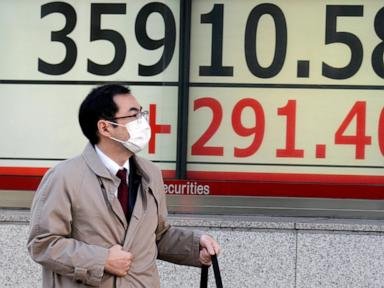NEW YORK — Wall Street is slumping Wednesday after a stronger-than-expected report on the U.S. economy weakened hopes that easier interest rates would arrive soon.
The S&P 500 was 0.7% lower in early trading and on track for a second straight drop after closing out its 10th winning week in the last 11. The Dow Jones Industrial Average was down 118 points, or 0.3%, as of 9:40 a.m. Eastern time, and the Nasdaq composite was 1.2% lower.
Rising yields in the bond market were once again putting downward pressure on stocks. Yields climbed after a report showed sales at U.S. retailers were stronger last month than economists expected. While that’s good news for an economy that’s defied many predictions for a recession, it could also keep upward pressure on inflation.
That, in turn, could push the Federal Reserve to wait longer than traders expect to begin cutting interest rates after jacking them drastically higher over the last two years. Lower rates would relax the pressure on the economy and financial system, while also goosing prices for investments.
The yield on the 10-year Treasury jumped immediately after the retail-sales report and climbed to 4.10% from 4.06% late Tuesday and from 3.85% a few weeks ago. Higher yields can crimp profits for companies, while also making investors less willing to pay high prices for stocks.
Higher yields hurt all kinds of investments, and high-growth stocks tend to be some of the hardest hit. Drops of 1..6% for Apple and Amazon were two of the heaviest weights on the S&P 500.
The yield on the two-year Treasury, which more closely tracks expectations for the Fed, rose more strongly. It climbed to 4.34% from 4.22% late Tuesday as traders trimmed their expectations for the Fed’s first rate cut to arrive in March. Traders are now betting on a 60% probability of that, down from a shade more than 70% a month earlier, according to data from CME Group.
Treasury yields have already eased significantly since autumn on expectations for coming rate cuts, which in turn has sent stock prices near record heights. The 10-year yield was as high as 5% in October, and a delay in rate cuts would likely undercut the rally.
A top Fed official, Gov. Christopher Waller, said Tuesday that the central bank could take its time before its next move on rates given how resilient the economy has remained.
“These comments leave a rate cut as early as March on the table but also indicate that such a move is not a done deal,” according to economists at Deutsche Bank led by Amy Yang.
On Wednesday, across the Atlantic Ocean, the head of the European Central Bank warned in a speech about the risks of cutting rates too soon.
If Wall Street’s predictions for the timing of the rate cuts it desires so much do indeed prove wrong, it would be just the latest example of overzealousness by traders.
Interest rates are one of the main levers that set stock prices. The other is corporate profits, and several big companies reported weaker results on Wednesday than analysts expected.
Charles Schwab was an outlier and reported stronger profit for the latest quarter than analysts expected. But its stock still fell 6.8%. Its revenue fell short of estimates, and analysts said its better-than-expected earnings were likely due in part to easier tax rates.
Spirit Airlines was under heavy pressure again and sank 17.9%. Its stock nearly halved a day before after a U.S. judge blocked its purchase by JetBlue Airways out of fear that it would lead to higher airfares. JetBlue lost 4.1%.
Wednesday’s slump for Wall Street followed a rough day for financial markets worldwide. Stock indexes fell more than 1% in Europe following the comments by Christine Lagarde, the head of the European Central Bank.
They dropped even more sharply in Asia. Stocks sank 3.7% in Hong Kong and 2.1% in Shanghai as worries continue about a sluggish recovery for the world’s second-largest economy.
Japan’s Nikkei 225, which has been one of the new year’s biggest winners, also fell and slipped 0.4%.
___
AP Business Writers Yuri Kageyama and Matt Ott contributed.
